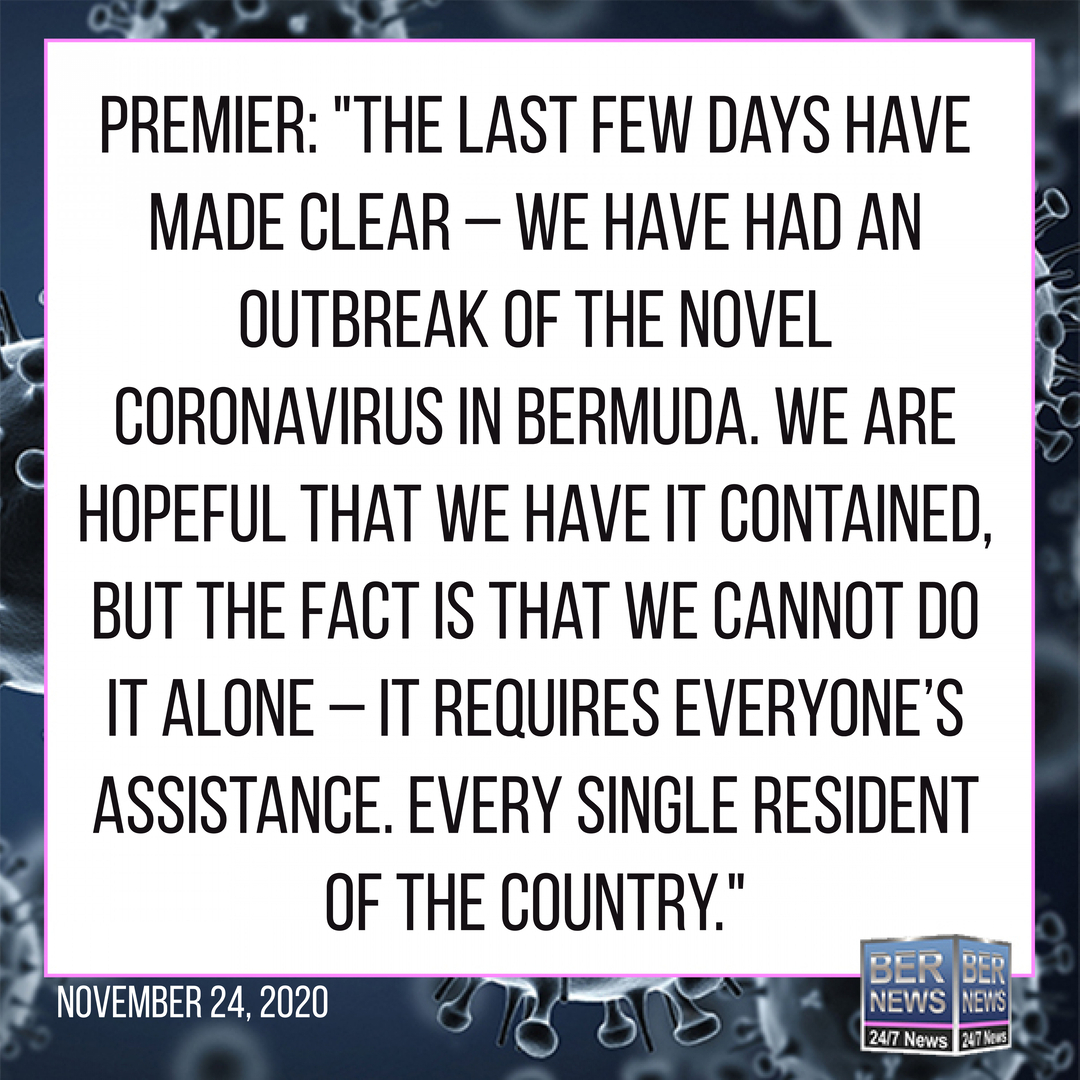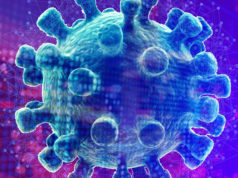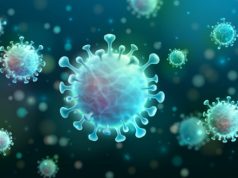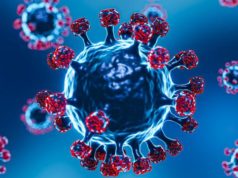[Updated] The Government will be holding a press conference at approximately 5.45pm this evening [Nov 24] to update the public on Covid-19.
Update: Minister Kim Wilson confirmed four new positive Covid-19 cases — one imported and three classified as local transmission with known contact — so Bermuda now has had a total of 239 confirmed positive cases to date and 25 are active.
The island’s status has changed from ‘sporadic cases’ to ‘clusters of cases’.
The Minister also stated that the “age range of all of our positive cases is from 0 to 101 years” – the range starting from “0” is a change from the past, when the age range started at 7.
The Minister said “additional public health restrictions will be put in place,” and said the Ministry is proposing to restrict care home visiting, reducing the allowed large group size from 75 to 50 persons and having a “more comprehensive mandatory mask mandate.”
Premier David Burt said, “As the Minister of Health has now indicated, and the last few days have made clear – we have had an outbreak of the novel coronavirus in Bermuda. We are hopeful that we have it contained, but the fact is that we cannot do it alone – it requires everyone’s assistance. Every single resident of the country.
He added, “I have no desire or wish to revert back to shelter in place. None of us want to go back to the place we were before. But, if we do not all do our part, we will be forced to do so. We have seen in other countries small outbreaks turn into larger outbreaks. That is not what we will have here, and I trust that the people of our country will cooperate so that we can constrain this outbreak.”
Update 8.31pm: Minister Kim Wilson’s full statement follows below:
Good Afternoon,
There were 808 test results received by the Ministry of Health yesterday [23 November 2020], and four were positive for COVID-19.
One of the new cases is classified as imported with details as follows:
- 1 resident who arrived on DL 584 from Atlanta on 22 November 2020 who tested positive on their arrival test, having not had a pre-test.
The additional three cases are classified as local transmission with known contact with details as follows:
- 1 resident having had close contact in the same household as a case under investigation linked to a workplace
- 2 residents having had close contact in the same household as a known case linked to the same workplace
Bermuda now has 239 total confirmed positive cases. Their status is as follows:
- there are 25 active cases, who are
- all under public health monitoring, and
- none are hospitalized or in critical care;
- a total of 205 have recovered, and
- the total deceased remains 9.
The average age of all of our confirmed positive cases is 53 years and the age range of all of our positive cases is from 0 to 101 years.
The average age of all deceased cases is 74 years and the age range is 57 to 91 years.
Overall, 48% of cases were Black, 45% White and 7% other/unknown.
The source of all cases is as follows:
- 115 are Imported
- 100 are Local transmission, with known contact/source
- 21 are Local transmission with an unknown contact/source, and
- 3 are under investigation
The seven-day average of our real time reproduction number is less than 1.
Bermuda’s current country status is now “Cluster of Cases”.
With the recent uptick in local COVID-19 cases, there have been some questions raised about what constitutes a ‘close contact’. I will try and provide some clarity around that point for you now…
When a positive case of COVID-19 is identified in the community, the Ministry of Health begin a process known as ‘Contact Tracing’ to determine who that person may have been in contact with and may have infected. A person can be either a ‘close contact’ or a ‘casual contact’.
‘Close contact’ means:
- Spending more than 15 minutes of face-to-face contact within six feet of an infected person in any setting;
- Living in the same house or shared accommodation as an infected person;
- Sitting within 2 seats of an infected person, in any direction, on an airplane.
‘Casual contact’ means:
- Spending less than 15 minutes of face-to-face contact within six feet of an infected person in any setting;
- Being in the same room as with an infected person for less than 2 hours;
- Being on an airplane with an infected person but not sitting near them.
Spending more than 2 hours in a closed space [such as an office of classroom] with an infected person can be either a close contact or a casual contact, depending on the circumstances. Whether it is classified as ‘casual’ or ‘close’ contact will depend on the size of the room and other factors. Health officials will let you know if you are at risk or not.
If you are a close contact of a case you must complete a 14 day quarantine. Remember that a breach in quarantine is an offence.
During these 14 days of quarantine, a case manager will phone you to monitor any symptoms you may have. If you develop any symptoms of coronavirus, call your GP. You’ll find out if you are a close contact because you will be notified by the Ministry of Health contact tracing team.
If you are a casual contact you should make sure you know the symptoms of coronavirus and be aware that you may develop them. You do not need to restrict your movement. If you develop symptoms of coronavirus, you will need to self-isolate and phone your GP straight away to get a test for coronavirus.
Persons who are a close contact should follow the guidance given to them individually by the Epidemiology and Surveillance Unit.
If you call the surveillance team and cannot get through immediately and are waiting a call-back, please be patient as there are many contacts to be traced and persons with the closest contacts will be contacted first.
Also, if there is an outbreak in your place of work or business, remember that if you and your staff have been compliant, as is required by policy [wearing a mask correctly at all times, washing hands and maintaining physical distancing where possible] your risk of infection from that outbreak will be significantly diminished. If you work in a smaller team in places where physical distancing is not possible or where staff travel together, you should also wear a mask. These basic practices protect us all every day and are in place to keep you safe.
None of us can be complacent at this time. Without the precautions we all know – mask wearing, physical distancing and hand-washing – one case can easily multiply and spread.
What contact tracing has taught us about the current increase in positive cases is that we are not staying within a small, defined ‘bubble’ at all times. We need to work much harder to limit our interactions with family and friends.
The Ministry advises that you reduce your bubble sizes now – choose only one or two other households to socialize with for the next few weeks. It is particularly easy to be casual in the workplace, and relax around colleagues as you would around your family. Do not do this.
As we enter the holiday season – typically a time when family and friends get together – we must be more mindful than ever about following these public health guidelines.
Therefore, I would like to restate a reminder to travellers which I issued in a press release last week: All travellers – including returning students – are subject to mobile quarantine restrictions on their movements and activities, until they receive a negative Day 14 COVID-19 test result.
Therefore all travellers should:
- Wear a mask at all times when in the company of others.
- Avoid indoor spaces.
- Not attend large family gatherings.
In particular, returning students should be careful of mixing with local students and family members while on island, prior to their negative Day 14 COVID-19 test result.
Similarly, those travelling for business should take the necessary precautions when returning and interacting with family and friends.
U.S. Epidemiologists have observed that the way most people become infected in the U.S. may be shifting. In the summer, a large driver of infections was young people socializing and bringing the virus home to their parents and relatives. Now, family and social gatherings are assuming a much more prominent role.
If you will be hosting or attending a gathering during the holiday season that brings people who live in different households together please listen to the following tips, as recommended by the CDC:
- Limit the number of attendees as much as possible to allow people from different households to remain at least 6 feet apart at all times. Guests should avoid direct contact, including handshakes and hugs, with others not from their household.
- Host outdoor rather than indoor gatherings as much as possible.
- Avoid holding gatherings in crowded, poorly ventilated spaces with persons who are not in your household.
- Increase ventilation by opening windows and doors.
- Require guests to wear masks. At gatherings that include persons of different households, everyone should always wear a mask that covers both the mouth and nose, except when eating or drinking.
- Encourage attendees to wash their hands often with soap and water for at least 20 seconds. If soap and water are not readily available, use hand sanitizer that contains at least 60% alcohol.
- Limit contact with commonly touched surfaces or shared items, such as serving utensils.
- Clean and disinfect commonly touched surfaces and any shared items between use when feasible.
- Plan ahead and ask guests to avoid contact with people outside of their households for 14 days before the gathering.
- Wear a mask while preparing food for or serving food to others who don’t live in your household.
- Limit people going in and out of the areas where food is being prepared or handled, such as in the kitchen or around the grill, if possible.
- Wash dishes in the dishwasher or with hot soapy water immediately following the gathering.
The more of these prevention measures that you put in place, the safer your gathering will be. No one measure is enough to prevent the spread of COVID-19.
Mindful of the change in our status from ‘sporadic cases’ to ‘clusters of cases’, additional public health restrictions will be put in place.
First, as we must be more cautious with our care homes due to the vulnerability of their population, the Ministry is proposing to restrict care home visiting. The primary change is a return to only essential visitors being allowed inside the home. However, restricted outdoor visiting will be permitted. This will impact the availability of activities in these homes, including daycare. The Ministry is currently consulting with care homes on this matter, and a decision and order will be issued before the week’s end.
Second, the Ministry will seek changes to the Public Health [COVID-19 Emergency Powers] [No. 3] Regulations 2020 to achieve:
- a reduction in large group size from 75 to 50 persons; and,
- a more comprehensive mandatory mask mandate.
In closing, I would like to re-emphasise the crucial importance of following public health protocols – wear your mask, practice physical distancing, cover your cough, stay home if you’re sick and avoid the 3 Cs: closed spaces, crowded spaces and close-contact settings.
Thank You.
Update 10.11pm: Premier David Burt’s comments:
Good Afternoon Bermuda, and welcome members of the media.
I am joined today by the Minister of Health, the Hon. Kim Wilson, who will be providing an update on the latest from her Ministry.
Following that I will give an update on matters related to the measures we must all continue to follow in order to keep our community safe and I will also provide details of the pilot of the WeHealth app, and also the details of the establishment checking app.
Thank you, Minister Wilson for today’s and yesterday’s update and thank you also to the Chief Medical Officer, Dr. Ayoola Oyinloye who joined you at yesterday’s press conference.
Today I will provide an overview of where we are in our ongoing fight against the coronavirus pandemic. It is my hope that Bermudians, residents, and tourists alike, will hear the message and not only adjust their personal behaviour but also encourage others to do their part to ensure everyone’s safety and wellbeing.
As I have said numerous times, we have come a long way and we should be rightfully proud of what we have achieved; more so as we have gotten those results with Bermudians at the heart of the battle.
Whether it is due to testing, technology, or correctly following protocols, we have been on the frontlines and have been largely successful in keeping Bermudians safe. International institutions and travel bodies from across the globe have all recognised our success so far.
I say, “so far”, because while our efforts have been largely effective, we are now faced with a new challenge.
As the Minister of Health has now indicated, and the last few days have made clear – we have had an outbreak of the novel coronavirus in Bermuda. We are hopeful that we have it contained, but the fact is that we cannot do it alone – it requires everyone’s assistance. Every Single Resident of the Country.
Our behaviour and the decisions we take now with this threat are much more important than how we initially responded to it. Our decisions are more important because we know the virus is here, social gatherings are permitted, our schools are open, and we are all trying to recover economically.
Our response is what got us here, but I know that now we have gotten used to living with COVID-19, some people are not as diligent as they once were.
Let me be clear – there are reasons why we have these important public health measures in place. And the reason for our collective success is that most of us have followed them and followed them well.
When you go out and people say, I don’t need a mask as no one in Bermuda has COVID – that is now no longer the case. But the only reason we were able to maintain that is because people wore masks, sanitised hands, kept distance, and did what was necessary.
Let me give an example of why these precautions are important.
For example, an infected person arrives in Bermuda, has had 2 negative tests and feels fine. They attend a social event. They do not follow public health rules, and because it’s “not comfortable” they don’t wear a mask and those around them don’t either. This individual doesn’t have any symptoms but during a subsequent test is then confirmed positive.
In this example, a single person has potentially exposed everyone they have been in contact with. All those persons who have now been exposed will lose the opportunity to work and will need to be quarantined. Their family will be inconvenienced, or worse they may be exposed and be at risk.
These are how the chains of transmission work, so it’s really important that we take precautions. In the example above if the person and persons around them were following public health advice the risk would be far reduced.
The laws of the country right now require social distancing and if you cannot maintain your distance they require you to wear a mask. That is the law.
I am confident in the regime that we have put in place, but it is vital that every single person in the country act as though everyone we are in contact with may be infected so we can reduce the chance of spread.
We have come too far to allow reckless decisions to impact the country, and so today Cabinet has agreed to tighten some of the restrictions that are in place. Thankfully we also know much more now than we may have known in March and we have many more tools at our disposal which allows us to follow a targeted approach.
The Minister of Health has covered some minor changes, but I want to be clear that these are just initial changes that are being implemented. There is extensive testing and contact tracing that is currently taking place, and if we believe there may be chains of transmission that we do not have a handle on, further and more severe action will be implemented immediately.
Further, as there is an outbreak, risks at certain establishments have been assessed and Bars are thought to be the largest risk vector.
Instructions have been issued to the Attorney General’s chambers to finalise changes to the regulations to require employees at these establishments to be screened by saliva testing for the coronavirus.
The Minister of Health will announce the times for the screening but it is anticipated that it will take place Wednesday and Thursday from 6PM at the Perot Post Office.
We do not want to close down establishments – but we must strike the balance. In other countries where there have been minor outbreaks immediate lockdowns were implemented. All bars, all restaurants, all gyms, all personal care services were immediately shut.
We do not yet feel that is warranted, but we need the cooperation of workers and owners of establishments where there is the biggest risk of persons gathering indoors and possible vectors of spread to cooperate.
We will continue to roll out additional screening as it is important that we have a grasp of what the outbreak looks like inside of Bermuda and to have a handle on it so that we can continue to be a success story rather than a casualty.
Just as a note to bartenders. Because you may get a saliva screening, and because you test negative, this does not mean that you can go to the bar to work and work without a mask. We have asked the police to adopt a zero tolerance approach. To be clear last week a zero tolerance approach was not adopted. It is far too important for persons to let their guard down right now.
I am confident that we can get through this very difficult period if we all remember the precautions that have been put in place. But, the zero tolerance approach, especially in licensed establishments, has been asked for by the Government and it is hopeful that it will be implemented.
It means that if you are an establishment that is not following the rules which have been laid out, under the law the police can close an establishment for 24 hours to give you time to cure. Let’s not let that happen.
I have no desire or wish to revert back to shelter in place. None of us want to go back to the place we were before. But, if we do not all do our part, we will be forced to do so. We have seen in other countries small outbreaks turn into larger outbreaks. That is not what we will have here, and I trust that the people of our country will cooperate so that we can constrain this outbreak.
There are additional measures that will be announced in the coming weeks. They are:
- The introduction of visual indicators so that persons can be aware of people who may have recently travelled and who present a higher risk to the public.
- There will be possible further size and reductions in the amount of groups and the Ministry of National Security will be far more judicious when it comes to approving large event permits. Specifically, events taking place indoors will be examined far more carefully and mostly outdoor events will be permitted.
I want to reiterate the importance for all Bermudians to help to assist all of the enforcement teams. If you see an establishment that is breaking the rules and putting us all at risk, call 211 and report it. To the owners of all the establishments in Bermuda, I reiterate again that now is the time to follow the rules. Now is the time to ensure that we are all doing our part.
As we put the Cabinet mandated measures in place, we will also use technology to help Bermuda manage the spread of the coronavirus. This week we will pilot the WeHealth Bermuda app, a new, free smartphone application that provides anonymous COVID-19 exposure notifications. It is one of the most sophisticated apps available anywhere in the world for helping to control the spread of the coronavirus.
The app leverages groundbreaking technology from Apple’s and Google’s jointly developed Exposure Notification System.
When paired with manual contact tracing—and combined with other preventative measures, such as wearing masks and physical distancing—WeHealth Bermuda gives us all even greater protection from the coronavirus.
The Government has partnered with WeHealth, an international public benefit corporation that created the WeHealth Bermuda app, to specifically customize this app for Bermuda.
The Department of Health is in the final testing phases of WeHealth Bermuda. We do expect to find fixes and improvements that need to be made during early testing, but this is a normal part of any app launch.
While we are in the final stages of testing the app, we welcome all Bermudians and visitors to download it ahead of the full launch from Apple’s App Store or Google Play. The app will run on iPhone models 6S and above with iOS version 13.7 installed. Android users can use the app if their phone supports Bluetooth Low Energy and Android Version 6 (API 23) or above.
During this testing period, we welcome anyone who has downloaded WeHealth Bermuda app to send feedback on their app experience.
Once the app is downloaded and installed, it runs in the background, just like any other app on your smartphone. When phones that have WeHealth Bermuda installed are near each other, the app uses Bluetooth signals to determine how long and how close the users were together.
If a WeHealth Bermuda user tests positive for the coronavirus, they can privately share their diagnosis within the app. WeHealth Bermuda will then automatically send an anonymous COVID-19 exposure notification to anyone who was in close proximity long enough to be considered at risk of COVID-19 infection.
Because the app logs Bluetooth signals and does not require contact information, WeHealth Bermuda can anonymously alert app users you do not personally know, which can help slow the spread.
Every WeHealth Bermuda exposure alert will provide app users with the date and time of the possible exposure, along with an estimated risk level, and next steps to take from the Ministry of Health.
Members of the WeHealth team met with the Privacy Commissioner and he supports the approach and steps the government has taken to protect the privacy and information of those who will download the app.
WeHealth Bermuda notifications can help alert others to potential exposure, even before symptoms appear. Exposure notifications also allow people to quickly take the next step to help prevent any possible spread.
WeHealth has a track record of success at two American universities where the app has been downloaded by 50,000 people. They have built off of that success to customize this app for Bermuda and our needs.
You can also find more information about WeHealth Bermuda at gov.bm/wehealthpilot. Or you can download the app today, just search WeHealth Bermuda inside of your app store.
Using technology, together we can make Bermuda safer.
Additionally there is another app which has been built by local Bermudians to assist establishments that are required to collect contact information of persons who enter their establishments. Last year the Government of Bermuda launched a boot camp in combination with Code441. Two of the students from that boot camp were engaged to build an app that scans your driver’s license for contact information. This information is not kept with the establishment itself, but is stored and accessed only if there has been an exposure and there is a need to contact trace afterwards.
This app is ready to launch. It is not inside the app stores as it is a fully web-based app and we will be giving further details as we roll it out over the next few days.
In closing, as we consider next steps and look at what needs to be done to prevent further spread in our community, I recognize that anxiety levels are increasing. People are concerned about what will happen next. This against the backdrop of people being unemployed and financial stresses are increasing for many. Depression, anxiety, and feeling alone are just a few of the emotions people may be experiencing.
Please understand that you don’t have to suffer alone or in silence. There is help available. There are professionals who will listen and provide guidance to you at this time. The emotional wellbeing hotline is a resource that you can use to talk with someone. The phone number is 543-1111. While we all work to make sure our physical health is taken care of, we must pay equal attention to our brain health. We must reach out and ask for help, when we need it.











